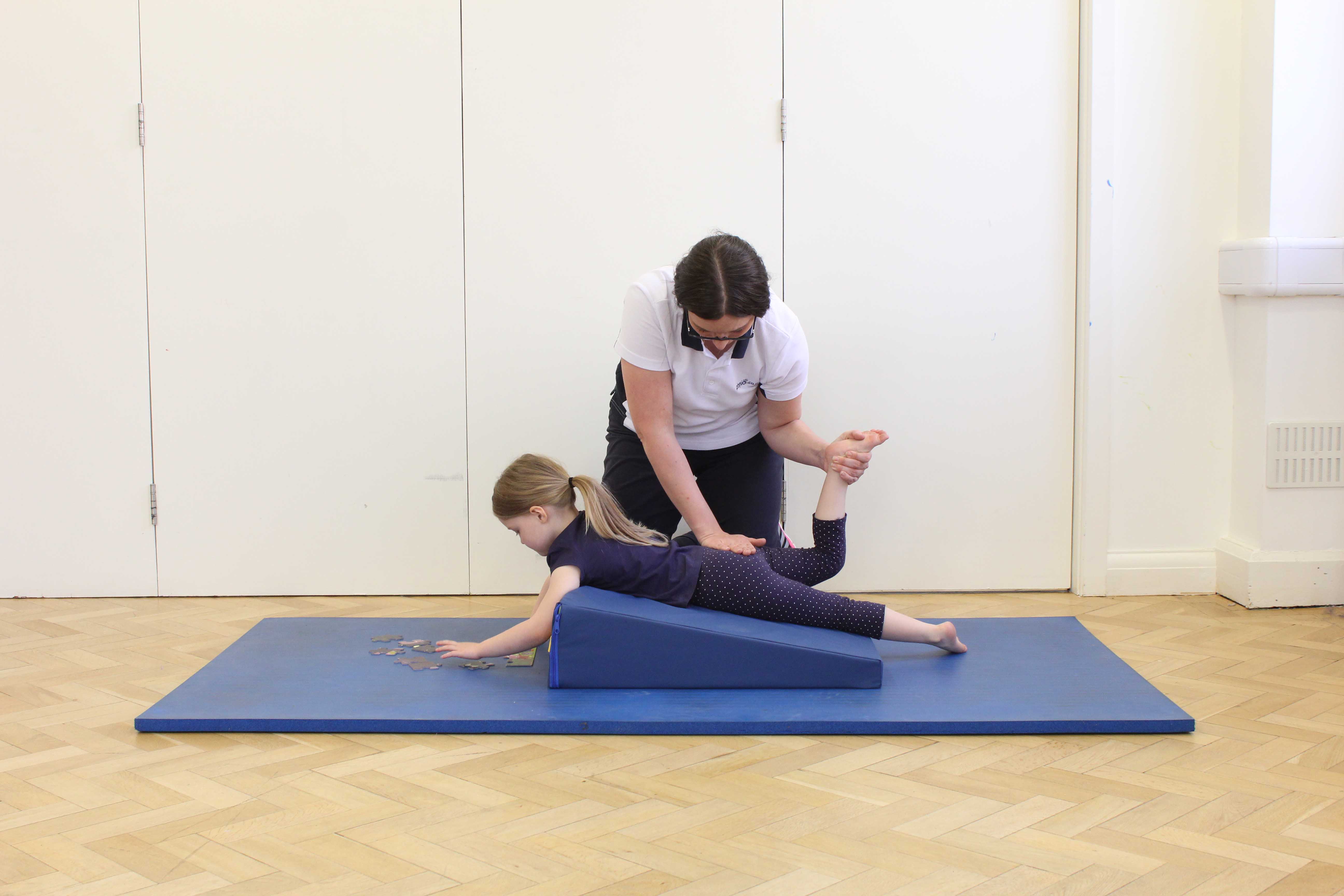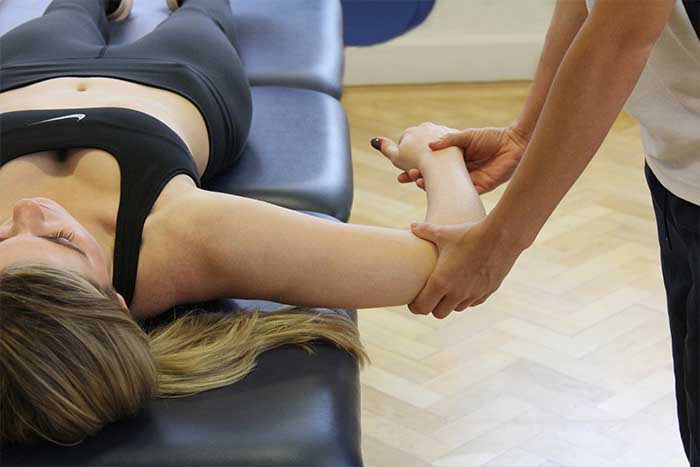Massage therapy can offer a wide variety of health benefits for babies which include both physiological and psychological improvements. Massage therapy can be used as a treatment technique to address a number of issues such as difficulty sleeping, repetitive crying and a poor immune system. A variety of slow and gentle massage techniques can be used and adapted for each baby's needs to achieve one or more treatment goals.
What is massage for babies?
Massage treatment can be beneficial to babies. Babies undergo a vast number of physiological changes before entering childhood which can be physically and mentally stressful. The application of massage can be enjoyable for babies and therefore assist in stress reduction and relaxation. The therapists at Physio.co.uk can provide a range of massage techniques which can be adjusted to suit the aims of the treatment session.

When can massage help babies?
Massage treatment can be extremely beneficial when applied to babies during a number of circumstances such as:
 Above: Massage and stretches of the hip and knee applied by a specialist paediatric physiotherapist
Above: Massage and stretches of the hip and knee applied by a specialist paediatric physiotherapistMassage can be beneficial when applied during the presence of acute pain. Acute pain may be experienced by babies during times of rapid growth. Acute pain may cause babies to repetitively cry and have a poor sleeping pattern. If left untreated acute pain can lead to babies becoming stressed, tired and unhappy. The application of light and gentle massage can reduce the feeling of pain for the baby through the pain gate theory. The pain gate theory states a non-harmful stimulus (massage) can override messages of a harmful stimulus (injury) on their journey up the spinal pathway to the brain. The pain gate theory explains how messages of pain do not reach the brain and therefore the feeling of pain is reduced. A reduction in acute pain can lead to babies feeling relaxed and happy.
Massage can benefit babies when applied during periods of high stress. Babies have to take in a vast amount of information daily as part of their learning and growing process. Taking in information can be stressful for babies which can stimulate an increase in the release of cortisol. Cortisol is a hormone secreted during periods of stress as part of the fight or flight response. Prolonged periods of high cortisol can lead the baby to become unhappy, repetitively cry and have a poor sleeping pattern. Massage can inhibit the production of cortisol, subsequently lowering levels of cortisol within the blood. A reduction in cortisol can also reduce feelings of anxiety, stress and depression and allow the baby to feel happy and relaxed.
Massage can be applied to promote relaxation in the baby. If a baby is stressed for a prolonged period of time it can interfere with appetite, sleeping pattern and can cause repetitive crying. Massage can be used to promote a deep state of relaxation for the baby which can not only reduce the present muscular tension but also stimulate the release of endorphins. The release of endorphins such as serotonin and dopamine can promote feelings of happiness, positive thoughts and relaxation. A reduction in muscular tension can allow for pain reduction and improved range of movement.
What are the physiological effects of a massage for babies?
The application of massage to babies can produce a number of physiological effects such as:
Massage can produce an increase in tissue temperature. An increase in tissue temperature is achieved through stimulating an increase in blood circulation. An increase in blood circulation is achieved through relaxing the smooth muscles which surround blood vessels causing them to widen, this process is referred to as vasodilation. An increase in blood circulation can increase the temperature of tissues which can lead to a reduction in pain, increased flexibility and maintenance of healthy muscles.
Massage can increase capillarisation. Capillarisation is a process whereby the number of capillaries within one area increased. Capillaries are blood vessels responsible for the exchange of oxygen and nutrients for waste products between the blood stream and working tissues. An increase in the number of capillaries can increase the efficiency of the exchange system between nutrients and waste products between the tissues and surrounding blood. An increase in capillarisation can also lead to improved recovery and healing and the maintenance of healthy muscles.
Massage can stimulate the release of natural endorphins serotonin and dopamine. Natural endorphins are released during times of deep relaxation and happiness. If levels of endorphins within the blood are low the baby may repetitively cry and have a poor appetite and sleeping pattern. Massage can stimulate the release of endorphins through light and gentle massage strokes.

What are the benefits of a massage for babies?
The massage treatment provided by the therapists at Physio.co.uk can benefit a baby in a number of ways. The benefits of massage for babies include:
Massage therapy can maintain the health of the baby's muscles. The maintenance of healthy muscles is achieved through an increased blood circulation and the removal of waste products. An increase in blood circulation is achieved through vasodilation, a process where blood vessels widen to allow more blood flow. An increase in blood circulation can increase the deliverance of essential nutrients for growth, repair and energy to the muscular tissues. Massage can maintain the health of muscles by assisting in the removal of waste products. Specific massage techniques can assist the lymphatic system in the removal of waste products from tissues and the transportation to the lymph nodes where the waste can be filtered and removed from the body. Massage treatment can act as a pump for the lymphatic system, helping push lymphatic fluid containing waste products from tissues to lymph nodes.
Massage can promote relaxation through decreasing levels of cortisol and increasing levels of endorphins, serotonin and dopamine. Massage can decrease levels of cortisol within the blood. Cortisol is a hormone released during times of stress, anxiety and fear. If levels of cortisol remain high for a long period of time the baby can begin to feel unhappy and may seem distressed with recurrent mood swings. The application of gentle massage strokes can inhibit the production of cortisol through promoting relaxation in a happy environment. Massage can also increase the release of endorphins, serotonin and dopamine. Endorphins such as serotonin and dopamine are linked to positive thoughts, happiness and relaxation. The decrease of cortisol and increase of natural endorphins will promote relaxation and allow your baby to be happy and cheerful with an improved appetite and sleeping pattern.
Massage can reduce stress, this is achieved through the decrease in muscular tension and a decrease in the release of cortisol. Massage can decrease muscular tension which may be a cause of stress due the associated symptom of pain. Massage can reduce muscular tension through increasing tissue temperature and blood circulation which can allow the tight muscle to increase in temperature, pliability and flexibility. Massage can inhibit the release of cortisol, a hormone produced during times of stress. High levels of cortisol can leave the baby feeling anxious, alert and scared. A reduction in the release of cortisol can leave the baby feeling relaxed, happy and content.
Summary
Massage treatment for babies can be beneficial in both a physiological and psychological sense. The benefits of massage can be exaggerated when applied during times of acute pain, stress and for relaxation purposes. Massage can produce a number of physiological effects such as increased temperature, capillarisation and the release of endorphins serotonin and dopamine. The physiological effects of massage can produce a number of benefits for the baby such as a reduction in stress, maintenance of healthy muscles and promoted relaxation.
How can I arrange a massage for babies?
To arrange a massage to help babies at Physio.co.uk, email us at office@physio.co.uk or call us on 0161 883 0077.
You can also book an appointment online and save £10.

 0330 088 7800
0330 088 7800



































